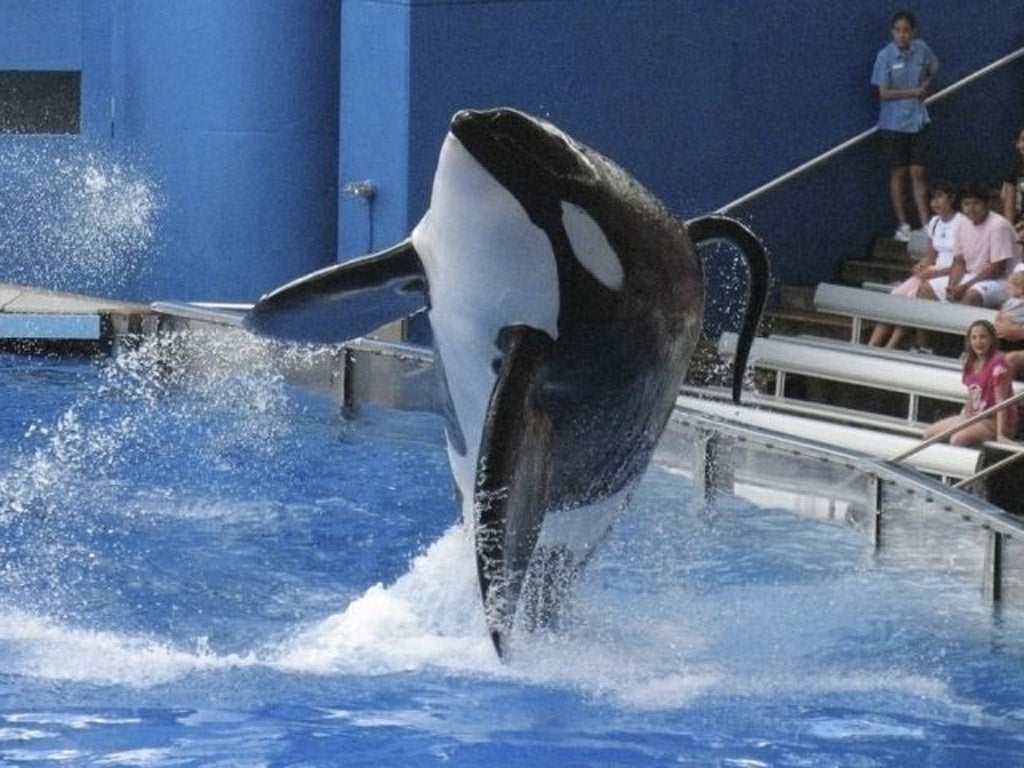Our treatment of orca underscores an extraordinary disconnection from the sea
As National Maritime Week opens we need to adjust our approach to these creatures

Summer holidays are here and millions of us are reacquainting ourselves with the sea’s charms. Mostly we are content to swim or paddle in it, forage in rock pools, or take boat trips. But sometimes our happy communion with the water and its denizens turns darkly sour.
Last week, up to 25 motorboats harassed a pod of bottlenose dolphins at Padstow in Cornwall, killing a rare dolphin calf in the process. That incident has been followed by another one in which a live, stranded porpoise was found by members of the public near a Butlins resort. Not only did they neglect to report it to the coastguard or any appropriate authority, but they moved it around and photographed it, without any attempt to return the creature to deeper water. It too died.
These shocking incidents from our heatwave summer exasperate campaigners, for whom protecting the sea has become a Sisyphean struggle. Conservation charities are pleading with Environment minister Richard Benyon to act on his promise to establish a network of Marine Conservation Zones around the UK. Despite experts’ recommendations for 127 such sites, only 31 have been selected by the Government, and even then, no timetable has been proposed.
Such vacillation only underlines our extraordinary disconnection from the sea and its animals – for all that we are an island nation. The sea covers a multitude of our sins, a victim of its ability to hide beneath what Herman Melville called “the ocean’s skin”. Astonishingly, until the 1980s, Britain was dumping nuclear waste off the Cornish coast. We discharge pesticides and fertilizers into the water from agricultural run-off; even the chemicals that coat our carpets and furniture find their way into the sea.
Our recreation also manages to bespoil. That scourge of the quiet beach, the jet ski, is ridden by unlicensed petrolheads, pumping out almost as much fuel as they burn up. Worse still, the cacophony disorientates cetaceans, which rely on hearing as their most important sense.
The University of Aberdeen has just published a study of a group of resident bottlenose dolphins in the Moray Firth that proves they use signature whistles, which act as their own names. With ironic timing, that report comes on the back of proposals, just approved by the Highland Council, for a £3bn, 277-turbine wind farm in the Moray Firth, whose construction and maintenance, conservationists fear, will severely disrupt the dolphins’ foraging and communication.
In the meantime, a just-released documentary, Blackfish, focuses on the apparent maltreatment of killer whales, or orca, by SeaWorld, a US industry recently valued at $2.7bn. Gabriela Cowperthwaite’s film is another indictment of our conflicted attitude to creatures which we profess to admire yet conspire to abuse. Orca are intensely social, intelligent, highly successful animals, found in every ocean – including a fragile resident population in Scottish waters which may constitute two separate species. One neuroscientist, Lori Marino, who has put living orca through MRI scans, concludes that these cetaceans have highly evolved brains, with enlarged lobes that deal with emotions; that they may be more emotionally developed than humans, as collective individuals with a “sense of self distributed among their group”.
Former trainers whom I interviewed, and who contributed to Blackfish, regard SeaWorld as an outdated spectacle against which public opinion is turning, much as it did against circuses. This change of attitude chimes with last year’s radical proposals to declare cetaceans, along with primates and elephants, “non-human persons” with attendant rights.
To European eyes, those brash American oceanaria seem outdated, tacky, even. But we can hardly assume the moral high ground on this issue. Britain didn’t ship out its last captive orca – Winnie, from Windsor Safari Park to SeaWorld – until 1991. When she died in 2002, a necropsy indicated that the cause of her demise was the coins, bits of tile and other objects she had swallowed during her two decades of captivity, and which she’d mistaken for food.
The Whale and Dolphin Conservation Society reports that captive orca have a median lifespan of only four years. Yet 45 remain in oceanaria, not only in the US, but within the EU, too, in Spain, France and the Netherlands. Opponents of these gruesome watery circuses hope that in the near future, the mere idea of keeping alpha predators in psychosis-inducing confinement will seem as barbaric as medieval bear-baiting.
This week, the British Wildlife Trusts and other organisers of National Marine Week hope to get us all out watching marine wildlife for free, rather than paying for them to perform for our pleasure. Perhaps our resident cetaceans – from the dolphins of Cardigan Bay to the minke whales off the west coast of Scotland – might even stand to benefit from our austerity. Fewer flights to Florida, and more standing on our own shores, waiting for an elusive, but far more rewarding glimpse of these beautiful, wild animals at sea. Where they should be.
Philip Hoare’s 'The Sea Inside' is published by Fourth Estate
Join our commenting forum
Join thought-provoking conversations, follow other Independent readers and see their replies
Comments